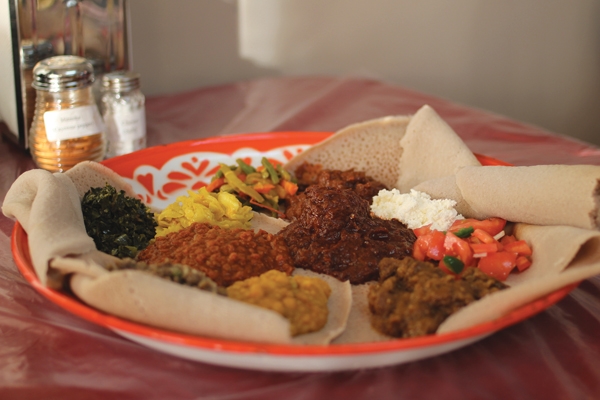Food Review: Mahider
Food Reviews

Mahider
1465 South State Street, Ste. 7
Salt Lake City, UT
801.975.1111
Mon.-Thur. 10 a.m.-10 p.m.
Fri.–Sat. 10 a.m.-11 p.m.
Sun. Noon-8 p.m.
When I first moved to Salt Lake City from rural Louisiana, one thing I loved about “big city life” was the vast variety of cuisines to sample, but I was disappointed that one of my favorites—Ethiopian—was missing. I made it a point to eat at Ethiopian restaurants any time I traveled because it is a wonderful and unique style of food, so I’m pleased to announce that we finally have our very own full-service Ethiopian eatery right here.
Sharing space with an African market in a State Street strip mall, Mahider won’t win any contests for décor or ambience. The dining area is decked out in the red, green and gold of the Ethiopian flag and decorated with photos of traditional dress, portraits and a depiction of the Ethiopian alphabet. On both my visits, the sound system played a variety of traditional and updated African songs with fast beats and ululating vocals. Plain red plastic table cloths on the tables tell you this is a homey place, but shakers labeled “Chewe” (salt) and “Mitmita” (powdered red cayenne pepper, rather than your usual ground black pepper) remind you that you’re here for something different. The staff seems to be recent immigrants, and most are shy with a little bit of a language barrier. This is not a fancy date-night restaurant, but don’t let that stop you. If your date balks at eating here, dump them and find someone more adventurous.
Ethiopian food is served in a style most Americans haven’t encountered before and is probably best saved for dining with someone you are comfortable with. There are no utensils and food is delivered family style atop a flat sourdough bread called injera. This bread, made from the indigenous grain teff, also serves as your utensil: Break off a piece and use it to scoop your entrees up. Rice can be substituted for the bread on request and Mahider will serve your meal in separate bowls if you ask, but where’s the fun in that? The menu offers a good variety of beef, poultry and vegetarian entrees, including several combos that allow you to experience a little of almost everything. There’s even a kid’s menu, several Ethiopian beers to select from, plus a spiced honey wine called Tej ($15) and American soft drinks.
Dishes range from the relatively unadventurous but delicious Yedoro Wot ($11), a delicately spiced chicken thigh grilled in a ginger-lemon sauce and served with homemade cottage cheese, to the very exciting Gored Gored ($10), beef spiced with honey and wine, served nearly raw. Quanta Firfir ($8), dried but tender beef cooked in the ubiquitous berbere (African chili) based wot sauce, is a delicious choice if you’re new to the cuisine. We also tried a light but spicy berbere beef stew, Yesega Wot ($8), and Yesega Alicha ($7), a tangy, dark brown stew spiced with turmeric. A beef and chicken combo ($12) includes Yedoro Wot, Yesega Wot and Yesega Alicha.
For vegetarians, the menu offers the highly recommended spicy Yemisisr Wot (lentils, $6.50) and the sharply spiced Tikil Gomen (cabbage, $6). You may also enjoy the fresh-tasting Gomen (collard greens, $6) and the light and refreshing Fesolia (mixed vegetables with green beans, $6.50). Our veggie combo ($9) included all of these plus a deliciously sweet and spicy potato mixture that didn’t appear to be on the menu.
The truly special menu item and the thing that really got me pumped about Mahider is the coffee ceremony ($10; menu says it’s a 3-person minimum, but they’ve made it for two twice now). True coffee lovers know that the Ethiopians discovered coffee, which they call bunna (boo-na). It’s not quick, so ask for it when you order your food and plan to spend some time waiting. Starting with 100% imported Ethiopian green coffee beans, the server roasts them at a special stand in the restaurant. About 30 minutes into your meal, as the scent of roasting coffee fills the air, she brings the popping and sizzling pan to your table and shakes the beans, then retreats to the kitchen to cool them. Meanwhile, she lights heady, heavy incense over charcoal and, when the beans are ready, grinds them to a soft powder and steeps them in a clay carafe. Finally, a little over an hour after you order, your server brings you a platter of sweet and salty popcorn and soon after that, demitasse cups of the strong, rich black brew cooled to the perfect drinking temperature. Ethiopians drink the coffee very sweet, but it is thick and creamy without any need for milk (and I’m normally one of those heavy-cream-in-my-coffee people).
I eat at a number of family-run, strip-mall ethnic eateries, and they share a tendency to be slower and more relaxed than more typical American restaurants. I’ve eaten at Mahider twice without getting the tomato salad that reportedly comes with the entrees, but others who have eaten there the same day as I did declare it delicious. Menu items may vary from what’s described, based on the available ingredients or perhaps the whim of the cook, and if you ask your server what something is or what’s in a dish, you might not get an answer. My suggestion is to just relax, enjoy this as part of the adventure and go on a day when you’re not in a hurry. And, if you’re allowed, get the coffee—you won’t be sorry!


